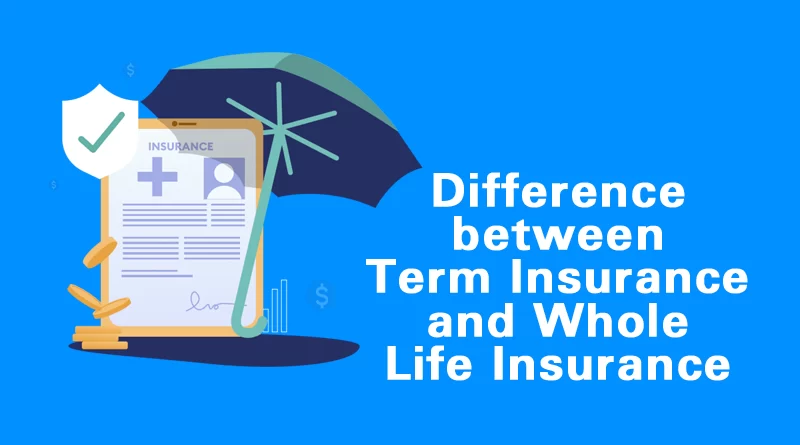Difference between Term Insurance and Whole Life Insurance
A life insurance policy is one of the important financial tools to protect your family in the event of your untimely demise. While no one likes to think about the possibility of suffering a serious accident or any other calamity, the fact is that these things can happen at any time without warning. This is why having a life insurance policy is so important.
There are various types of life insurance available, each offering different levels of coverage and benefits. Amongst these, whole life insurance and term insurance offer the most basic and comprehensive life insurance coverage, respectively.
While they are both types of life insurance, they offer very different benefits and protection. Understanding the key differences can help you decide which policy is best for you. Here’s a breakdown of the differences between term and whole life insurance policies.
Post Content
Explaining whole life insurance
Whole life insurance policies differ from other insurance policies that typically have a set term, such as 10, 20, or 30 years. And unlike term life insurance, which only covers the policyholder for a set period of time, whole life insurance provides coverage for as long as the policy remains active.
Whole life insurance policies also have a cash value component, which grows over time and can be accessed by the policyholder if they need it.
Benefits of whole life insurance
- Lifelong protection
- Better cash value
- Dividends
- Availability of money for borrowing
Explaining term insurance
Term insurance offers financial coverage to the policyholder’s family for a fixed duration. The beneficiaries may receive a death benefit payout if the policyholder passes away during the policy term.
Moreover, the policyholder has to make timely premium payments to keep the plan active. You can use a term insurance calculator online to understand the estimated premium amount you may have to pay for your term insurance plan.
Most companies also offer riders that can be added to the term insurance, such as accidental death cover, critical illness cover, etc. Moreover, term insurance policies have lower premium costs even while providing a large sum assured.
Benefits of term insurance
- High sum assured at affordable premium
- Multiple death benefit payout options
- Easy to understand
- Additional riders
- Accidental death benefit coverage
- Critical illness coverage
- Return of premium option
Key differences between term insurance and whole life insurance
- Term insurance is for a fixed period, while whole life insurance can be extended to 100 years.
- Whole life insurance has an investment component, while term insurance does not.
- While buying a Term insurance online, premiums are generally lower than whole life insurance premiums.
- Whole life insurance policies may have cash value, while term life insurance policies do not.
- You may borrow against a whole life policy, but not a term life policy.
- Whole life insurance often pays dividends that can be used to reduce premiums or increase coverage, while term life insurance does not.
Tips before buying term Insurance or whole life insurance
If you decide to buy life insurance, there are a few things to take into account. They are:
- Assess your insurance needs
- Compare insurance policies
- Choose a cover that you can afford
- Go for a reputable life insurance provider
- Evaluate the future of your insurance policy
- Carefully read the final policy document
- Choose a comprehensive plan
- Evaluate your life insurance needs from time to time
Term vs. whole life insurance: Which one to buy?
Buy term insurance online if:
- You have financial dependents who are likely to stay dependent for a specific period. They can include children who may grow up and become financially stable.
- You cannot pay life insurance premiums for a longer time.
Buy whole life insurance if:
- You have financial dependents who may stay dependent on you for a longer period or their entire life. They can include a dependent spouse or kids with special needs.
To sum up
Life insurance is a crucial financial tool to help you prepare for the unexpected. And no matter which type of insurance you choose, it is important to understand all its inclusions and exclusions. Moreover, always compare policies thoroughly to understand which insurance serves your needs best, and then make an informed decision.
Also Read: Different Types of Life Insurance Policies in India




